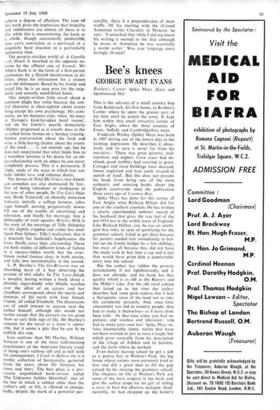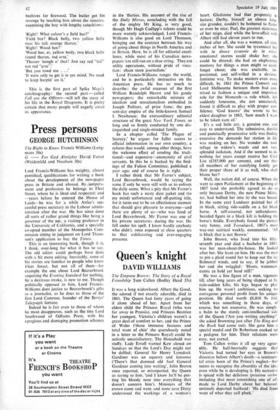Bee's knees
GEORGE EWART EVANS
Reuben's Corner Spike Mays (Eyre and Spottiswood 30s)
This is the odyssey of a small country boy from Kuldysack, his first home, to Reuben's Corner where he spent the greater part of his time until he joined the army. It kept him within that small attractive corner of East Anglia where the three counties of Essex, Suffolk and Cambridgeshire meet.
Frederick Wesley (Spike) Mays was born in 1907 during one of the lowest dips in the farming depression. He describes it objec- tively and its aura is never far from his narrative: 'There was great poverty, mal- nutrition and neglect. Corn areas had de- clined, good stubbles had reverted to grass. Cottages and farm buildings were decayed, fences neglected and lean cattle strayed in search of food'. But this does not prevent his book from being one of the most authentic and amusing books about the English countryside since the publication three years ago of Country Boy.
Spike Mays has done for this corner of East Anglia what Richard Hillyer did for one of the southern counties. He has written a clearly apprehended, unbitter record of his boyhood that gives the true feel of the pre-1914 era in the arable areas of England. Like Richard Hillyer, too, he was an intelli- gent boy who, in spite of qualifying for the grammar school, failed to get there because his parents needed him immediately to bol- ster up the family budget by a few shillings, but most of all because they did not have the ready cash to buy him a cap and a suit that would have given him a comfortable entry into the school.
But the author has ridden the poverty nonchalantly if not lightheartedly, and it does not obtrude; and his book has that quality which is as old as the Reeve's and the Miller's tales. For the old rural culture that lasted up to the time the author describes had some grim aspects, but it had a therapeutic sense of the need not to take life completely seriously. And, since little amusement was fed to country people, they had to make it themselves—as I have often been told: 'At that time o'day you had no pictures and wireless and television : you had to make your own fun'. Spike Mays re- lates innumerable funny stories that have not been worked in just to raise a laugh, but which grow naturally from his description of the village of Ashdon and its hamlets, and the farm where he worked.
Even before leaving school he got a job as a pantry boy at Walton's Park, the big house whose owners were extremely kind to him and did a great deal to fill the gap caused by his missing the grammar school. The chapters on life at Walton's Park are some of the most original in the book and give the author scope for his gift of telling a story in bare but effective dialogue. Inad- vertently, he had chopped up the butler's beehives for firewood. The butler got his revenge by teaching him about the inmates, examining the boy with lengthy catechisms: 'Right! What colour's a field bee?'
'Field bee? Black belly, two yellow belts near his tail, orange thorax.'
'Right! Wood bee?'
'Wood bee, er, yellow body, two black belts round thorax, red arse.'
Thasser 'nough o' that! Jest say red "tail" not red "arse".'
'But you towd me. . .
'It were only to get it in yer mind. No need to keep harpin' on it.'
This is the first part of Spike Mays's autobiography: the second part — called Fall out the Officers—will tell the story of his life in the Royal Dragoons. It is pretty certain that many people will eagerly await its appearance.



































 Previous page
Previous page